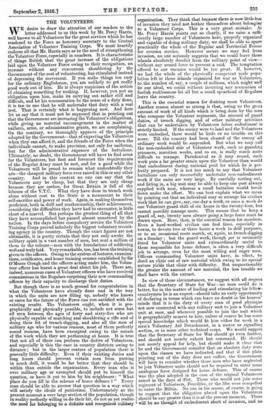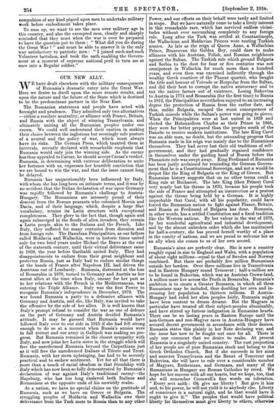THE VOLUNTEERS.
WE desire to draw the attention of our readers to the V V letter addressed to us this week by Mr. Percy Harris, well known to all. Volunteers for the great services which he has rendered to the Force as honorary secretary to the Central Association of Volunteer Training Corps. We most heartily endorse all that Mr. Rallis says as to the need of strengthening the Volunteer Force, especially in numbers. It is characteristic of things British. that the great increase of the obligations laid upon the Volunteer Force owing to their recognition, an increase without any concurrent shouldering by the Government of the cost of volunteering, has stimulated instead of depressing the movement. If you make things too easy for the ordinary Englishman, you are unlikely to get really good work out of him. He is always suspicious of the notion of obtaining something for nothing. If, however, you put an obligation upon him, make its carrying out rather stiff and difficult, and let his remuneration be the sense of a duty done, it is ten to one that he will undertake that duty with a real zest. That is certainly what is happening now. And here let us say that it must not be supposed that in pointing out that the Government are increasing the Volunteer's obligations, while giving no material encouragement in the matter of uniform, arms, or administrative grants, we are complaining. On the contrary, we thoroughly approve of the principle adopted by the Government—that of expecting the Volunteers when they can afford it, and the friends of the Force when the individuals. cannot, to make provision, not only for uniforms, but for the administrative expenses of the battalions. Ultimately, no doubt, the Government will have to find arms for the Volunteers, but first and foremost the requirements of the Regular Army must. be met, and for a good while the Volunteers will be proud to remain what undoubtedly they are—the cheapest military force ever raised in this or any other country. And in this context no one can say that the Volunteers may be cheap, but that they are only cheap because they are useless, for Great Britain is full of the labours of the V.T.C. What they have done in trench work alone without cost to the State is a monument to their self-sacrifice and power of work. Again, in making themselves proficient, both in drill and marksmanship, their achievement, considering the difficulties they have had to encounter, is little short of a marvel. But perhaps the greatest thing of all that they have accomplished has passed almost unnoticed by the nation. In the days before compulsory service the Volunteer Training Corps proved infinitely the biggest voluntary recruit- ing agency in the country. Though the exact figures are not obtainable, it is pretty certain that they not only awoke the military spirit in a vast number of men, but sent a million of them to the colours—men with the foundations of soldiering well and truly laid. Very remarkable, too, has been the training given to the officers. Owing to the system of lectures, examina- tions, certificates, and home training courses established by Sir O'Moore Creagh and the officers acting under him, the Volun- teer officer has learnt a great deal about his job. There are, indeed, numerous cases of Volunteer officers who have received .commissions in the Regulars surprising their new commanding officers by their capacity to discharge their duties.
But though there is so much ground for congratulation in what the Volunteers have already done and in the way in which the units are now filling up, nobody who knows or. eares for the future of the Force can rest satisfied with the existing results. The Volunteers ought, when it is geo- graphically and physically possible, to include not some but all men between the ages of forty and sixty-five who are physically capable of marching and shouldering a rifle and of doing their bit of trench-digging, and also all the men of military age who for various reasons, most of them perfectly sound reasons, have been exempted owing to the nature of the work which they are performing at home. It is true that not all of these can perform the duties of Volunteers, and especially is this the case in country districts owing to distance ; but in the larger centres of population there is generally little difficulty. Even if their existing duties and long hours should prevent certain men from putting in much drill, it would be far better that they should be within than outside the organization. Every man who is over military age or exempted should put to himself the question, or have it put to him by his neighbours : " What place do you- fill in the scheme of home defence ? " Every man should be able to answer that question in a way which will satisfy the ideals of patriotism. Unfortunately at the present moment a very large section of the population, though in reality perfectly willing to do their bit, do not as yet realize the need for belonging- to a definite and recognized organization,. They think that because there is now little feat of invasion they need not bother themselves about belonging to a Volunteer Corps. This is a very great mistake. M Mr. Percy Harris points out so clearly, if we raise a suffi- ciently large number of Volunteers here, properly organized and capable of doing military duty, we shall be able to spare practically the whole of the Regular and Territorial Forces for oversee service. However secure we may feel from invasion, no one seriously suggests that we could leave these islands absolutely derelict from the military point of view— without any armed force to prevent a raid. The temptation offered to our enemies would be too great. If, however, we had the whole of the physically competent male popu- lation left in these islands organized for war as Volunteers, to the number of, say, a couple of millions, which might well be our ideal, we could without incurring any accusation of foolish• recklessness let all but a small spearhead of Regulars leave the country.
This is the essential reason for desiring more Volunteers. Another reason almost as strong is that, owing to the great amount of work of all kinds which is being done by the men who compose the Volunteer regiments, the amount of guard duties, of trench digging, and of other military activities that can be undertaken by Volunteers before embodiment is strictly limited. If the enemy were to land and the Volunteers were embodied, there would be little or no trouble on this score. Till the country had been cleared of the enemy all ordinary work would be suspended. But what we may call the non-embodied side of Volunteer work, such as guarding prisoners, munition works, and so on, is really much more difficult to manage. Paradoxical as it may sound, such work puts a far greater strain upon the Volunteer than would that embodiment during national peril for which he is per- fectly prepared. It is not too much to say that Volunteer battalions can only successfully undertake non-embodiment work if the units are very large. By carefully sorting out, and fitting in, a big unit may be able to keep one post always supplied with men, whereas a small battalion would break down under the effort. We can best explain what we mean by pointing out that an individual may so arrange his civilian work that he can give, say, one day a week, or once a week do one Volunteer guard shift of six hours in the twenty-four, but cannot possibly manage more. This means that to keep a guard of, say., twenty men always going a large force must he drawn upon. Here, then, is the essential reason for numbers. Even a hard-worked civilian can find time, especially in towns, to devote two or three hours a week to drill purposes, or to an occasional route march, or, again, to trench-digging on a Sunday ; but the guard work, though per se eminently fitted for Volunteer units and extraordinarily useful to those responsible for home defence, is often a very difficult job to arrange, even for the- most willing and eager men.
Officers commanding Volunteer units have, in effect, to distil an elixir out of raw material which owing to its special nature yields that elixir with difficulty. But unquestionably the greater the amount of raw material, the less trouble we shall have with the extract.
In view of these circumstances, we suggest with all respect that the Secretary of State for War—no man could do it better, for in the matter of leading and stimulating his fellow- countrymen he is an expert--should take an early opportunity of declaring in terms which can leave no doubt in his hearers' minds that it is the duty of every man of good physique not now connected with any military unit to join a Volunteer unit at once, and wherever possible to join the unit which is geographically nearest to him, unless of course he has some special knowledge which would fit him either for work in a men's Voluntary Aid Detachment, in a motor or signalling section, or in some other technical corps. We would suggest that the Secretary of State for War should go even further, and should not merely exhort but command. He should not merely appeal for help, but should make it clear that he and the Government consider that an absolute duty rests upon the classes we have indicated, and that if this plain pointing out of the duty does not suffice, the Government will have to consider whether those men who have neglected to join Volunteer units should not be required to enter some analogous force designed for home defence. This of course was the plan adopted in the case of the original Volunteers raised in the days of Pitt. Those who would not join some regiment of Volunteers, Fencibles, or the like were compelled to enter the Militia. No one in his senses, of course, is going to suggest that the obligation placed upon the Volunteers should be any greater than it is at the present moment. There will be no. thought of embodiment short of invasion, and no compulsion of any kind placed upon men to undertake military work before embodiment takes place.
To sum up, we want- to see the men over military age in this country, and also the exempted men, clearly and sharply reminded that they must when the war is over be prepared to-have the question put to them : " What did you do during the Great War ? " and must be able to answer it in the only way satisfactory to patriotic men : " I joined such-and-such Volunteer battalion, and took the oath enabling the Govern- ment at a moment of supreme national peril to turn me at once into a Regular soldier."































 Previous page
Previous page